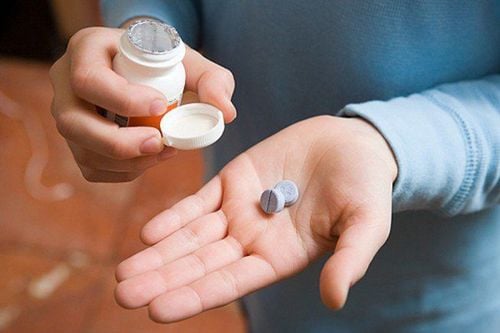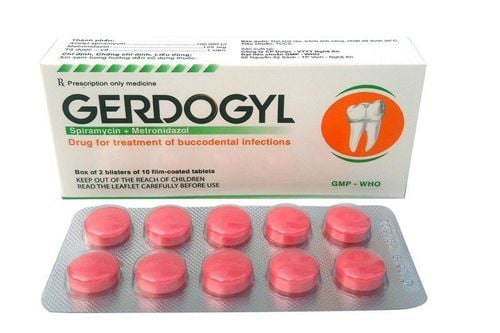This is an automatically translated article.
Klion medicine 250mg contains the active ingredient metronidazole, an antibiotic of the nitroimidazole group. The drug is indicated in the treatment of infections caused by amoebae, Giardia and anaerobic bacteria.
1. What is Klion 250mg?
Klion 250mg medicine contains the active ingredient metronidazole with a strength of 250mg. Metronidazole is an antibiotic of the nitroimidazole group, with a spectrum of activity on protozoa such as amoeba, Giardia and anaerobic bacteria. The mechanism of action of metronidazole is not really clear. In parasites, the 5-nitro group of the drug is reduced to cytotoxic intermediates. These substances will bind to the helical structure of the DNA molecule, breaking these strands and thereby causing cell death.
Metronidazol has strong activity in the treatment of protozoa infections such as Entamoeba histolytica, Giardia lamblia and Trichomonas vaginalis. Metronidazole is bactericidal against Bacteroides, Fusobacterium and obligate anaerobes but has no effect on aerobic bacteria. Therefore, when infected with both aerobic and anaerobic bacteria, metronidazole must be combined with other antibiotics. Metronidazole is also the treatment of choice in the treatment of diarrhea caused by Clostridium difficile. Metronidazole is rapidly and completely absorbed from the gastrointestinal tract, reaching concentrations of about 10 micrograms/ml in plasma 1 hour after 500 mg oral administration. The plasma half-life of metronidazole is approximately 8 hours and the volume of distribution is comparable to that of body water (0.6 - 0.8 l/kg). About 10-20% of the drug is bound to plasma proteins. Metronidazole is well distributed into tissues and body fluids, saliva and breast milk. The drug can also achieve therapeutic concentrations in the cerebrospinal fluid. Metronidazole is metabolised in the liver to active metabolites and partly eliminated in the urine as glucuronide.
2. What are the effects of Klion 250mg?
Klion 250mg medicine can be prescribed for the following cases:
Trichomonas vaginalis infection in the genital and urinary tracts of both men and women. Dysentery infection causes acute intestinal or hepatic abscess. Infection with other gastrointestinal parasites such as Giardia lamblia, Dientamoeba fragilis (children), Dracunculus medinensis. Infections of the abdomen, female genitals, skin/mucosa, sepsis, central nervous system, endocarditis,... caused by sensitive anaerobic bacteria. Bacterial infection, inflammation in the oral cavity (gingiva, tooth roots). Stomach and duodenal ulcers caused by H. Crohn's disease
3. Usage and dosage of Klion 250mg
3.1 How to take Klion 250mg is taken orally, after meals. The patient must not break, chew, or crush the tablet, but must take the tablet whole.
3.2 Dosage The dose will depend on the type of infection and the severity of the illness. The dose of Klion is as follows:
Vaginal thrush: 1 tablet x 3 times/day, used for 7 days (both men and women). Parasitic infections in the digestive tract: adults take 1.5g - 2g/day, divided into 4 times; Children use dose 40-50mg/kg/day, divided into 4 times. Infections caused by anaerobic bacteria: adults take a dose of 30-40mg/kg/day, divided into 4 times; Children take 25mg/kg/day, divided into 4 times. Amoebic liver abscess: Adults take a dose of 500 - 750 mg x 3 times / day for 5 - 10 days. Acute amoebic dysentery caused by E. histolytica: Can be used alone or in combination with iodoquinol or with diloxanide furoate. The usual dose in adult patients is 750 mg, 3 times a day for 5 - 10 days. Peptic ulcer disease caused by H. pylori : Oral 500 mg x 3 times daily, in combination with bismuth, proton pump inhibitor and other antibiotics such as amoxicillin, for 2 weeks. Giardia infection: 250 mg x 3 times/day or 500 mg x 2 times/day for 5 to 7 days
4. Side effects of Klion 250
When using Klion 250mg, patients may experience side effects including:
Frequency > 10%:
Gastrointestinal: Nausea Urinary: Vaginitis Nervous system: Headache Frequency 1 to 10%:
Dermatology: Genital itching Digestive: Abdominal pain, digestive disorders, diarrhea Genitourinary system: Dysmenorrhoea, urinary tract infection, urinary abnormalities Infection: Bacterial infection, infection Candida Nervous system: Dizziness Respiratory: Flu-like symptoms, pharyngitis, rhinitis, sinusitis, upper respiratory tract infections Frequency not known:
Cardiovascular: Chest pain, facial edema, redness flushing, palpitations, peripheral edema, syncope, tachycardia Dermatological: Pruritus rash, hyperpigmentation, pruritus, urticaria Endocrine: Decreased libido Digestive: Colic, anorexia, apple Constipation, decreased appetite, dyspepsia, epigastric discomfort, glossitis, salpingitis, stomatitis, vomiting Genitourinary system: Cystitis, dark urine (rare), painful urination, urinary frequency, incontinence urinalysis, urine discoloration, vaginal dryness, candidiasis â Hematology: granulocytopenia and eosinophilia Immune: Drug reaction with eosinophilia and systemic symptoms Nervous system: chills, depression, somnolence, seizures, loss sleep, irritability, numbness, mental disorders Neuromusculoskeletal: Arthralgia, asthenia, muscle spasms, myalgia Ophthalmology: Abnormal eye movements, nystagmus Renal: Polyuria Respiratory: Difficulty breathing, stuffy nose Other: Fever
5. Notes when using Klion 250mg
Klion is contraindicated in patients with a history of hypersensitivity to metronidazole or other nitro-imidazole derivatives. Superinfection: Prolonged use of metronidazole can lead to fungal or bacterial superinfections, including C. difficile diarrhea and pseudomembranous colitis. Diarrhea caused by C. difficile has been observed after more than 2 months of antibiotic treatment. Hepatic impairment: Klion should be used with caution in patients with hepatic impairment due to the potential for drug accumulation. Dosage adjustment is recommended in patients with severe hepatic impairment. Renal impairment: Caution should be exercised when using Klion in patients with renal failure due to the potential for drug accumulation. Dosage should be adjusted according to the patient's glomerular filtration rate. Seizure disorders: Use with caution in patients with a history of seizure disorders. Because of neurotoxicity and leukopenia, caution should be exercised when Klion is administered to patients with central nervous system disease and a history of hematopoietic disorders. Blood counts should be checked in patients with hematopoietic disorders or on prolonged high-dose therapy. The use of metronidazole may immobilize the spirochete Treponema pallidum and cause a false-positive reaction when performing the Nelson test. Concomitant use of Klion with alcohol may cause disulfiram-type reactions because metronidazole inhibits alcohol dehydrogenase and other alcohol oxidizing enzymes. Symptoms include flushing, sweating, nausea, vomiting, cardiovascular collapse, myocardial infarction,... Therefore, alcohol should not be consumed while taking Klion 250mg. Ability to drive and use machines: An overdose of Klion may cause symptoms such as headache, dizziness, convulsions, which may affect the ability to drive and use machines. Pregnancy: Metronidazole can cross the placenta. Several cases of cleft lip with or without cleft palate have been reported following first-trimester exposure to metronidazole. However, most studies have not shown an increased risk of birth defects or other adverse effects to the fetus when the mother used metronidazole during pregnancy. Because metronidazole can cause cancer in some animals, scientists are still concerned about the use of metronidazole during pregnancy. Therefore, the drug should not be used during early pregnancy. Lactation: Metronidazole and its active hydroxyl metabolite are present in human milk at concentrations similar to those in maternal plasma. Therefore, breastfeeding should be discontinued while taking Klion 250. In summary, Klion 250mg is an antibiotic indicated in the treatment of infections caused by anaerobic bacteria, amoebae and Giardia. Before using the drug, patients should consult a doctor or pharmacist before use.
Please dial HOTLINE for more information or register for an appointment HERE. Download MyVinmec app to make appointments faster and to manage your bookings easily.













